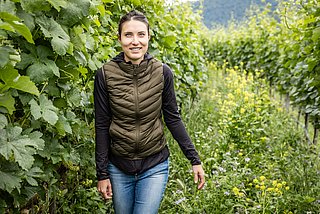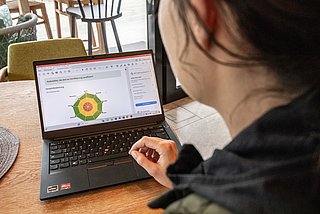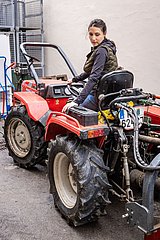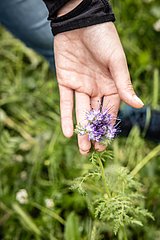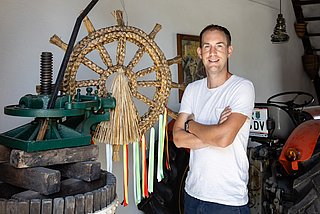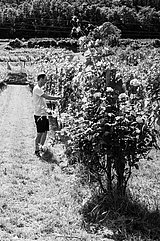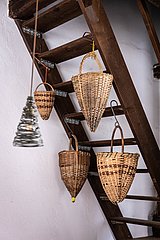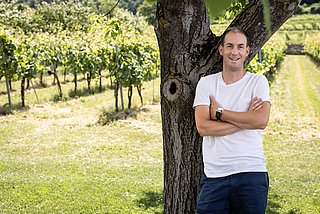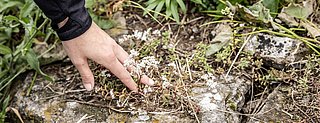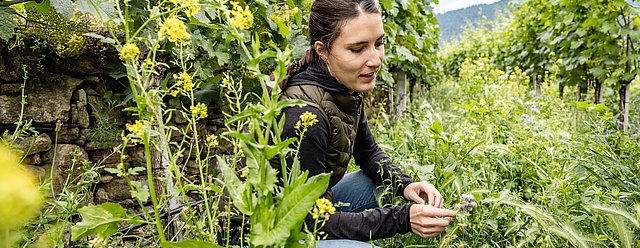
Taking a holistic view
Two estates. On opposite riverbanks. A common vision. Julia Donabaum and Matthias Pöchlinger are working towards more sustainable winegrowing in the Wachau region.
For a good team, you need at least five players: plants with shallow roots as well as deep-rooters, a flowering variety and two others. When Julia Donabaum talks about her seed mixture for greening the vineyard, you can feel her passion. “This is where I can be creative,” she adds with a laugh. Together with her father, she manages the family estate, known as Strawanzer, at Spitz an der Donau. The two generations, with two different approaches, enrich each other. “I want to show how well sustainable cultivation works in winegrowing.” Depending on the site, Julia Donabaum varies the plant seed mixture she uses for greening the rows. An example? On the “1000-Eimerberg” – literally “Thousand Bucket Hill” – for the paths between rows she uses a different mixture than in the Setzberg vineyard, and yet another combination down below around the estate buildings. Sustainable cultivation means selective cultivation – choosing the right plants for a particular microclimate and soil variety.
Vineyard greenery is one of many factors considered for Nachhaltig Wachau (Sustainable Wachau) certification. Vinea Wachau member estates are collectively implementing the quality label, which Julia Donabaum’s estate proudly holds since the 2021 vintage. “I find it good that Nachhaltig Wachau takes a holistic view of estates.” Alongside ecological factors, social and economic criteria are also rated. This translates into a matrix, which vintners can then draw on for ongoing improvements. “At one point I realised actually how many times a year we take the tractor into each of the vineyards. Certification is sparking our motivation to keep improving.” Julia Donabaum also finds it positive that the Wachau region has taken this step collectively. “As a group, we push ourselves forward.” She is also open for organic cultivation, and can imagine such techniques playing a future role in her vineyards. With foresight, she has already completed a certification course in organic winegrowing. Julia Donabaum has even applied some of these techniques in practice, to help the vines cope better with high temperatures and excessive rainfall. “Greenery not only improves soil biology but also its ability to soak up heavy rains. And when it gets really hot, plants close to the ground keep the vineyards cool and moist.”
Also across the Danube, on the south bank, many Vinea Wachau members have qualified for Nachhaltig Wachau certification. One of them is the estate run by Matthias Pöchlinger at Mittarnsdorf. He has also limited his tractor use, one of many steps taken in the vineyards. “Even my father was into cultivating grapes without using herbicides. Now the right time has come for me to take it a step further,” the vintner tells us. After achieving Nachhaltig Wachau certification with the 2022 vintage, he is now in the process of converting to organic methods. “I’m not doing all this just for me. One day I’d like to hear my son say: Dad did it right already back then.” Many other vintners think in terms of generations, which is now motivating them to switch to new techniques. Matthias Pöchlinger also has a longer perspective: “I want to develop the estate so that it’s still viable in future. That means taking a holistic approach. To me this is what sustainability is all about.”
Besides vineyards, Matthias’ estate is currently also home to apricot groves and a small Heuriger wine tavern. His wife Eva-Maria runs a local restaurant. “Family is the main thing. In a functioning family, everything else falls into place.” That might well be said for Vinea Wachau: one big family that thinks in terms of generations. That is how sustainability works in the Wachau.
